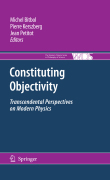
Constituting objectivity: transcendental perspectives on modern physics
Bitbol, M.
Kerszberg, P.
Petitot, J.
In recent years, many philosophers of modern physics came to the conclusion that the problem of how objectivity is constituted (rather than merely given) can no longer be avoided, and therefore that a transcendental approach in the spirit of Kant is now philosophically relevant. The usual excuse for skipping this task is that the historical form given by Kant to transcendental epistemology has been challenged by Relativity and Quantum Physics. However, the true challenge is not to force modern physics into a rigidly construed static version of Kant’s philosophy, but to provide Kant’s method with flexibility and generality. In this book, the top specialists of the field pin down the methodological core of transcendental epistemology that must be used in order to throw light on the foundations of modern physics. First, the basic tools Kant used for his transcendental reading of Newtonian Mechanics are examined, and then early transcendental approaches of Relativistic and Quantum Physics are revisited. Renewed understanding of modern physics offered by the concept of constitution of objectivity Contemporary relevance of Kant’s philosophy of science Debate between realism and empiricism redefined from a transcendental standpoint
- ISBN: 978-1-4020-9509-2
- Editorial: Springer
- Encuadernacion: Cartoné
- Páginas: 425
- Fecha Publicación: 01/02/2009
- Nº Volúmenes: 1
- Idioma: Inglés
